Analysis of the Arbovirosis Potential Occurrence in Dobrogea, Romania
Abstract
:1. Introduction
2. Materials and Methods
2.1. Study Region
2.2. Materials and Methodology
- Analysis of the current distribution and climate factors favoring the establishment of Ae. albopictus in Europe.
- 2.
- Understanding the physiological plasticity of Ae. albopictus.
- 3.
- Analysis of climate dynamics in Dobrogea in terms of the parameters identified in the first two steps. The aim is to determine the suitability of the climate for Ae. albopictus establishment.
- 4.
- Building a GIS-based model for analyzing the spatial correlation between the climatic parameters identified.
3. Results and Discussion
3.1. Analysis of the Current Distribution and Climate Factors Favoring the Establishment of Ae. albopictus in Europe
- ➢
- According to Figure 4, the geographical areal boundary is between the latitudes of 52.3004° N (Netherlands—Haarlemmermeer region) and 36°8′0″ N (Gibraltar), and the longitudes of 8°17′0″ W (Penafiel area—Portugal) [32] and 44°49′16″ E (Bagratashen—Armenia) [34]. The limits are debatable, especially in the North and South.
- ●
- In The Netherlands, Ae. albopictus was discovered in greenhouses at 52.3004° N, even if some adults were found outdoors [49]. In Belgium, Shaffner et al. [50] consider that the area surrounding the observation site (Oost-Vlaanderen province) favors the mosquitos’ spread because they found immature stages of this species during the study period. The authors specified that the larvas and pupas came from The Netherlands and “have been on-site for 4–5 months” [50]. Considering the map provided by Kraemer [22], we should consider Jena (50°55′38″ N latitude) or Essen (51°27′3″ N), Germany as the northern limit of Ae. albopictus areal.
- ●
- Information about the presence of the study species South of Gibraltar is not available. However, Leshem et al. [33] reported in 2012 suitable conditions for the autochthonous transmission of dengue in Israel, meaning that the Ae. albopictus was already installed.
- ➢
- ➢
- The mean annual temperature in the zones where the Ae. albopictus appeared in Europe is 12.56 °C. The territories where the Ae. albopictus were detected are located between the 7.8 °C and 17.8 °C isotherms (Freudenstadt-Germany and Gibraltar, respectively). In most of them, the temperatures vary between 9 °C and 13.8 °C (Figure 4).
- ●
- The average multiannual maximum temperature is 26.59 °C, with variations between 32.6 °C (Podgorica—Montenegro) and 20.6 °C.
- ●
- The average multiannual minimum temperature is 0.58 °C, with variations between –6.2 °C (Ploiesti, Romania) and 7 °C (Gibraltar) or 9.3 °C (when considering the data series from Israel, as well).
- ➢
- The average multiannual precipitation is 850.5 mm, with variations from 419 mm (Sardinia—Italy) to the 2393 mm (Batumi—Georgia) isohyets (Figure 5).
- ➢
- The average multiannual humidity is about 75%, varying between 64% (Croatia and Bagratashen—Armenia) and 84% (when considering The Netherlands as well) or 81% (Constanta—Romania, without The Netherlands data). Taking into account Israel, the minimum is registered at Jerusalem—53%.
3.2. Understanding the Physiological Plasticity of Ae. albopictus
3.3. Analysis of Climate Dynamics in Dobrogea
3.4. Building a GIS-Based Model for Analyzing the Spatial Correlation between the Climatic Parameters Identified
4. Conclusions
Author Contributions
Funding
Institutional Review Board Statement
Informed Consent Statement
Data Availability Statement
Conflicts of Interest
References
- Johnson, N.B.; Hayes, L.D.; Brown, K.; Hoo, E.C.; Ethier, K.A. Leading Causes of Morbidity and Mortality and Associated Behavioral Risk and Protective Factors—United States, 2005–2013. Morbidity and Mortality Weekly Report—Supplements; Centers for Disease Control and Prevention: Atlanta, GA, USA, 2014; Volume 63, pp. 3–27.
- Centers for Disease Control and Prevention. Chronic Obstructive Pulmonary Disease among Adults—United States, 2011. MMWR: Morbidity and Mortality Weekly Report 2012; Centers for Disease Control and Prevention: Atlanta, GA, USA, 2012; Volume 61, pp. 938–943. Available online: https://www.cdc.gov/mmwr/preview/mmwrhtml/mm6146a2.htm (accessed on 19 October 2020).
- Dumitru, I.M.; Lilios, G.; Arbune, M. Respiratory infections and air pollution, retrospective study over the past 10 years. J. Environ. Prot. Ecol. 2018, 19, 1445–1451. [Google Scholar]
- Hess, J.J.; McDowell, J.Z.; Luber, G. Integrating climate change adaptation into public health practice: Using adaptive management to increase adaptive capacity and build resilience. Environ. Health Persp. 2012, 120, 171–179. [Google Scholar] [CrossRef] [Green Version]
- Centers for Disease Control and Prevention. Deseases Carried by Vectors. Available online: https://www.cdc.gov/climateandhealth/effects/vectors.htm (accessed on 22 October 2020).
- WHO. Vector-Borne Diseases. Available online: https://www.who.int/news-room/fact-sheets/detail/vector-borne-diseases (accessed on 22 October 2020).
- Leta, S.; Beyene, T.J.; De Clercq, E.M.; Amenu, K.; Kraemer, M.U.G.; Revie, C.W. Global risk mapping for major diseases transmitted by Aedes aegypti and Aedes albopictus. Int. J. Infect. Dis. 2018, 67, 25–35. [Google Scholar] [CrossRef] [Green Version]
- Stanaway, J.D.; Shepard, D.S.; Undurraga, E.A.; Halasa, Y.A.; Coffeng, L.E.; Brady, O.J. The global burden of dengue: An analysis from the Global Burden of Disease Study 2013. Lancet Infect. Dis. 2016, 16, 712–723. [Google Scholar] [CrossRef] [Green Version]
- European Centre for Disease Prevention and Control. Aedes aegypti—Factsheet for Experts 2018. Available online: https://ecdc.europa.eu/en/disease-vectors/facts/mosquito-factsheets/aedes-aegypti (accessed on 22 October 2020).
- Global Invasive Species Database—Aedes albopictus. Available online: http://www.iucngisd.org/gisd/species.php?sc=109 (accessed on 22 October 2019).
- Lowe, S.; Browne, M.; Boudjelas, S.; De Poorter, M. 100 of the World’s Worst Invasive Alien Species—A selection from the Global Invasive Species Database, The Invasive SpeciesSpecialist Group (ISSG) a Specialist Group of the Species Survival Commission (SSC) of the World Conservation Union (IUCN). Available online: https://www.iucn.org/content/100-worlds-worst-invasive-alien-species-a-selection-global-invasive-species-database (accessed on 22 January 2021).
- European Centre for Disease Prevention and Control. Dengue outbreak in Réunion, France, 5 July 2018. Available online: https://www.ecdc.europa.eu/sites/portal/files/documents/Dengue%20outbreak%20in%20Reunion,%20France.pdf (accessed on 22 October 2020).
- European Centre for Disease Prevention and Control. Dengue outbreak in Madeira, Portugal, 2012. Available online: https://www.ecdc.europa.eu/sites/default/files/media/en/publications/Publications/dengue-outbreak-madeira-mission-report-nov-2012.pdf (accessed on 15 December 2020).
- European Centre for Disease Prevention and Control. Dengue Annual Epidemiological Report for 2017. Available online: https://ecdc.europa.eu/sites/portal/files/documents/dengue-annual-epidemiological-report-2017.pdf (accessed on 21 October 2020).
- European Centre for Disease Prevention and Control. Local Transmission of Dengue Fever in France and Spain, 22 October 2018. Available online: https://www.ecdc.europa.eu/sites/portal/files/documents/08-10-2018-RRA-Dengue-France.pdf (accessed on 25 October 2020).
- Surveillance Atlas of Infectious Disease. Available online: https://atlas.ecdc.europa.eu/public/index.aspx (accessed on 5 January 2021).
- Belik, V.; Geiser, T.; Brockmann, D. Natural human mobility patterns and spatial spread of infectious diseases. Phys. Rev. X 2011, 1, 011001. [Google Scholar] [CrossRef] [Green Version]
- Salami, D.; Capinha, C.; Martins, M.D.; Sousa, C. Dengue importation into Europe: A network connectivity-based approach. PLoS ONE 2020, 15, e0230274. [Google Scholar] [CrossRef]
- European Centre for Disease Prevention and Control—Technical Report—Development of Aedes albopictus Risk Maps 2009. Available online: www.ecdc.europa.eu/sites/portal/files/media/en/publications (accessed on 15 December 2020).
- Fischer, D.; Thomas, S.M.; Neteler, M.; Tjaden, N.B.; Beierkuhnlein, C. Climatic suitability of Aedes albopictus in Europe referring to climate change projections: Comparison of mechanistic and correlative niche modelling approaches. Euro. Surveill. 2014, 19, 20696. [Google Scholar] [CrossRef] [Green Version]
- Kraemer, M.U.; Sinka, M.E.; Duda, K.A.; Mylne, A.Q.; Shearer, F.M.; Barker, C.M.; Moore, C.G.; Carvalho, R.G.; Coelho, G.E.; Van Bortel, W.; et al. The global distribution of the arbovirus vectors Aedes aegypti and Ae. albopictus. Elife 2015, 4, e08347. [Google Scholar] [CrossRef] [PubMed]
- Kraemer, M.U.; Reiner, R.C.; Brady, O.J.; Messina, J.P.; Gilbert, M.; Pigott, D.M.; Yi, D.; Johnson, K.; Earl, L.; Marczak, L.B.; et al. Past and future spread of the arbovirus vectors Aedes aegypti and Aedes albopictus. Nat. Microbiol. 2019, 4, 854–863. [Google Scholar] [CrossRef] [PubMed]
- Kamal, M.; Kenawy, M.A.; Rady, M.H.; Khaled, A.S.; Samy, A.M. Mapping the global potential distributions of two arboviral vectors Aedes aegypti and Ae. albopictus under changing climate. PLoS ONE 2018, 13, e0210122. [Google Scholar] [CrossRef] [PubMed]
- Prioteasa, L.F.; Dinu, S.; Fălcuţă, E.; Ceianu, C.S. Established Population of the Invasive Mosquito Species Aedes albopictus in Romania. J. Am. Mosq. Control Assoc. 2015, 31, 177–181. [Google Scholar] [CrossRef] [PubMed]
- Fălcuţă, E.; Prioteasa, L.F.; Horváth, C.; Pastrav, I.R.; Schaffner, F.; Mihalca, A.D. The invasive Asian tiger mosquito Aedes albopictus in Romania: Towards a country-wide colonization? Parasitol. Res. 2020, 119, 841–845. [Google Scholar] [CrossRef] [PubMed]
- European Centre for Disease Prevention and Control and European Food Safety Authority. Mosquito Maps [Internet]. Stockholm: ECDC. 2020. Available online: https://ecdc.europa.eu/en/disease-vectors/surveillance-and-disease-data/mosquito-maps (accessed on 7 January 2021).
- Hawley, W.A. The biology of Aedes albopictus. J. Am. Mosq. Contr. 1988, 4, 1–40. [Google Scholar]
- Li, Y.; Kamara, F.; Zhou, G.; Puthiyakunnon, S.; Li, C.; Liu, Y.; Zhou, Y.; Yao, L.; Yan, G.; Chen, X.G. Urbanization Increases Aedes albopictus Larval Habitats and Accelerates Mosquito Development and Survivorship. PLoS Negl. Trop. Dis. 2014, 8, e3301. [Google Scholar] [CrossRef] [PubMed] [Green Version]
- Maftei, C.; Bărbulescu, A. Statistical analysis of climate evolution in Dobrudja region. In Proceedings of the World Congress on Engineering 2008, London, UK, 2–4 July 2008; IAENG: Hong Kong, China, 2008; Volume 2, pp. 1082–1087. [Google Scholar]
- Lockwood, J.L.; Hoopes, M.; Marchetti, M. Invasion Ecology; Blackwell Publishing: Malden, MA, USA, 2008. [Google Scholar]
- Akıner, M.M.; Öztürk, M.; Başer, A.B.; Günay, F.; Hacıoğlu, S.; Brinkmann, A.; Emanet, N.; Alten, B.; Özkul, A.; Nitsche, A.; et al. Arboviral screening of invasive Aedes species in northeastern Turkey: West Nile virus circulation and detection of insect-only viruses. PLoS Negl. Trop. Dis. 2019, 13, e0007334. [Google Scholar] [CrossRef]
- Osório, H.C.; Zé-Zé, L.; Neto, M.; Silva, S.; Marques, F.; Silva, A.S.; Alves, M.J. Detection of the Invasive Mosquito Species Aedes (Stegomyia) albopictus (Diptera: Culicidae) in Portugal. Int. J. Environ. Res. Public Health 2018, 15, 820. [Google Scholar] [CrossRef] [Green Version]
- Leshem, E.; Bin, H.; Shalom, U.; Perkin, M.; Schwartz, E. Risk for Emergence of Dengue and Chikungunya Virus in Israel. Emerg. Infect. Dis. 2012, 18, 345–347. [Google Scholar] [CrossRef]
- Paronyan, L.; Babayan, L.; Manucharyan, A.; Manukyan, D.; Vardanyan, H.; Melik-Andrasyan, G.; Schaffner, F.; Robert, V. The mosquitoes of Armenia: Review of knowledge and results of a field survey with first report of Aedes albopictus. Parasite 2020, 27, 42. [Google Scholar] [CrossRef]
- Walther, D.; Scheuch, D.E.; Kampen, H. The invasive Asian tiger mosquito Aedes albopictus (Diptera: Culicidae) in Germany: Local reproduction and overwintering. Acta Trop. 2017, 166, 186–192. [Google Scholar] [CrossRef]
- Climate-data.org. Available online: https://en.climate-data.org/ (accessed on 22 October 2019).
- Delatte, H.; Gimonneau, G.; Fontenille, D. Influence of Temperature on Immature Development, Survival, Longevity, Fecundity, and Gonotrophic Cycles of Aedes albopictus, Vector of Chikungunya and Dengue in the Indian Ocean. J. Med. Entomol. 2009, 46, 33–41. [Google Scholar] [CrossRef]
- Kobayashi, M.; Nihei, N.; Kurihara, T. Analysis of Northern Distribution of Aedes albopictus (Diptera: Culicidae) in Japan by Geographical Information System. J. Med. Entomol. 2002, 39, 4–11. [Google Scholar] [CrossRef] [PubMed] [Green Version]
- Medlock, J.M. Analysis of the potential for survival and seasonal activity of Aedes albopictus (Diptera: Culicidae) in the United Kingdom. J. Vector Ecol. 2006, 31, 292–304. [Google Scholar] [CrossRef]
- Mitchell, C.J. Geographic spread of Aedes albopictus and potential for involvement in arbovirus cycles in the Mediterranean basin. J. Vector Ecol. 1995, 20, 44–58. [Google Scholar]
- Monteiro, L.C.C.; de Souza, J.R.B.; de Albuquerque, C.M.R. Eclosion rate, development and survivorship of Aedes albopictus (Skuse) (Diptera: Culicidae) under different water temperatures. Neotrop. Entomol. 2007, 36, 966–971. [Google Scholar] [CrossRef] [PubMed] [Green Version]
- Thomas, S.M.; Obermayr, U.; Fischer, D.; Kreyling, J.; Beierkuhnlein, C. Low-temperature threshold for egg survival of a post-diapause and non-diapause European aedine strain, Aedes albopictus (Diptera: Culicidae). Parasite Vector 2012, 5, 100. [Google Scholar] [CrossRef] [Green Version]
- Bărbulescu, A. Modeling temperature evolution. Case study. Rom. Rep. Phys. 2016, 68, 788–798. [Google Scholar]
- Bărbulescu, A. Models for temperature evolution in Constanta area (Romania). Rom. J. Phys. 2016, 61, 676–686. [Google Scholar]
- Bărbulescu, A.; Deguenon, J. Change point detection and models for precipitation evolution. Case study. Rom. J. Phys. 2014, 59, 590–600. [Google Scholar]
- Bărbulescu, A.; Deguenon, J. About the variations of precipitation and temperature evolution in the Romanian Black Sea Littoral. Rom. Rep. Phys. 2015, 67, 625–637. [Google Scholar]
- Bărbulescu, A.; Maftei, C. Modeling the climate in the area of Techirghiol Lake (Romania). Rom. J. Phys. 2015, 60, 1163–1170. [Google Scholar]
- Bărbulescu, A.; Maftei, C.; Dumitriu, C. The modeling of the climatic process that participates at the sizing of an irrigation system. Bull. Appl. Comput. Math. Tech. Univ. Bp. 2002, XCVII D, 11–20. [Google Scholar]
- Scholte, E.-J.; Jacobs, F.; Linton, Y.-M.; Dijkstra, E.; Fransen, J.; Takken, W. First Record of Aedes (Stegomyia) albopictus in the Netherlands. Europ. Mosq. Bull. 2007, 22, 4–9. [Google Scholar]
- Schaffner, F.; Bortel, W.; Coosemans, M. First record of Aedes (Stegomyia) albopictus in Belgium. J. Am. Mosq. Control Assoc. 2004, 20, 201–203. [Google Scholar] [PubMed]
- Toma, L.; Severini, F.; Di Lucca, M.; Bella, A.; Romi, R. Seasonal patterns of oviposition and egg hatching rate of Aedes Albopiczus in Rome. J. Am. Mosquito. Contr. 2003, 19, 19–22. [Google Scholar]
- Skolka, M. The Asian Tiger Mosquito–Aedes albopictus (Skuse, 1894) in Constanta and abroad. In Proceedings of the 8th International Zoological Congress of Grigore Antipa Museum, Bucharest, Romania, 16–19 November 2016. [Google Scholar]
- Stocker, T.F.; Qin, D.; Plattner, G.-K.; Tignor, M.; Allen, S.K.; Boschung, J. Climate Change 2013: The physical science basis. In Contribution of Working Group I to the Fifth Assessment Report of the Intergovernmental Panel on Climate Change; IPCC, Cambridge University Press: Cambridge, UK; New York, NY, USA, 2013; p. 1535. [Google Scholar]
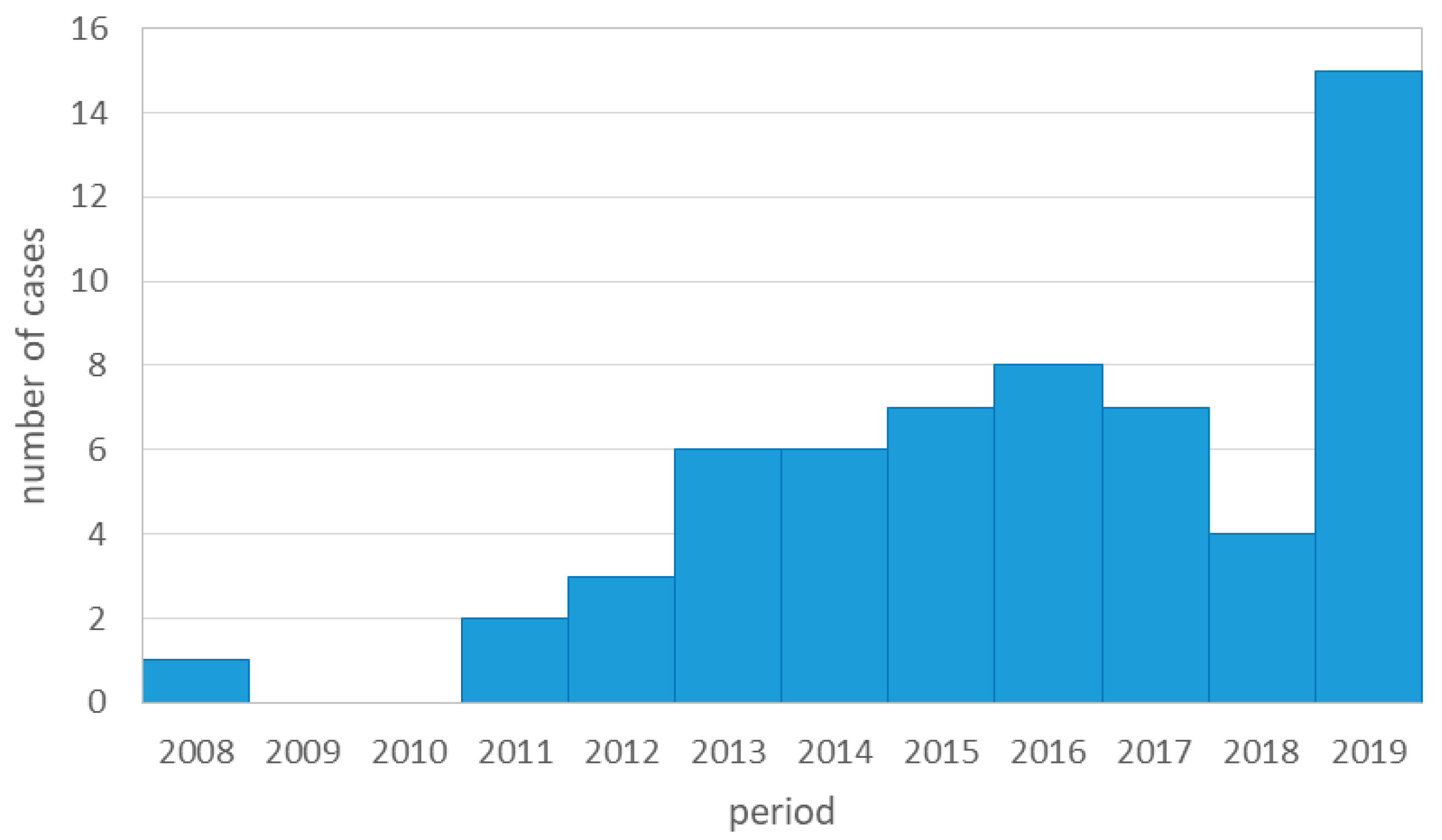
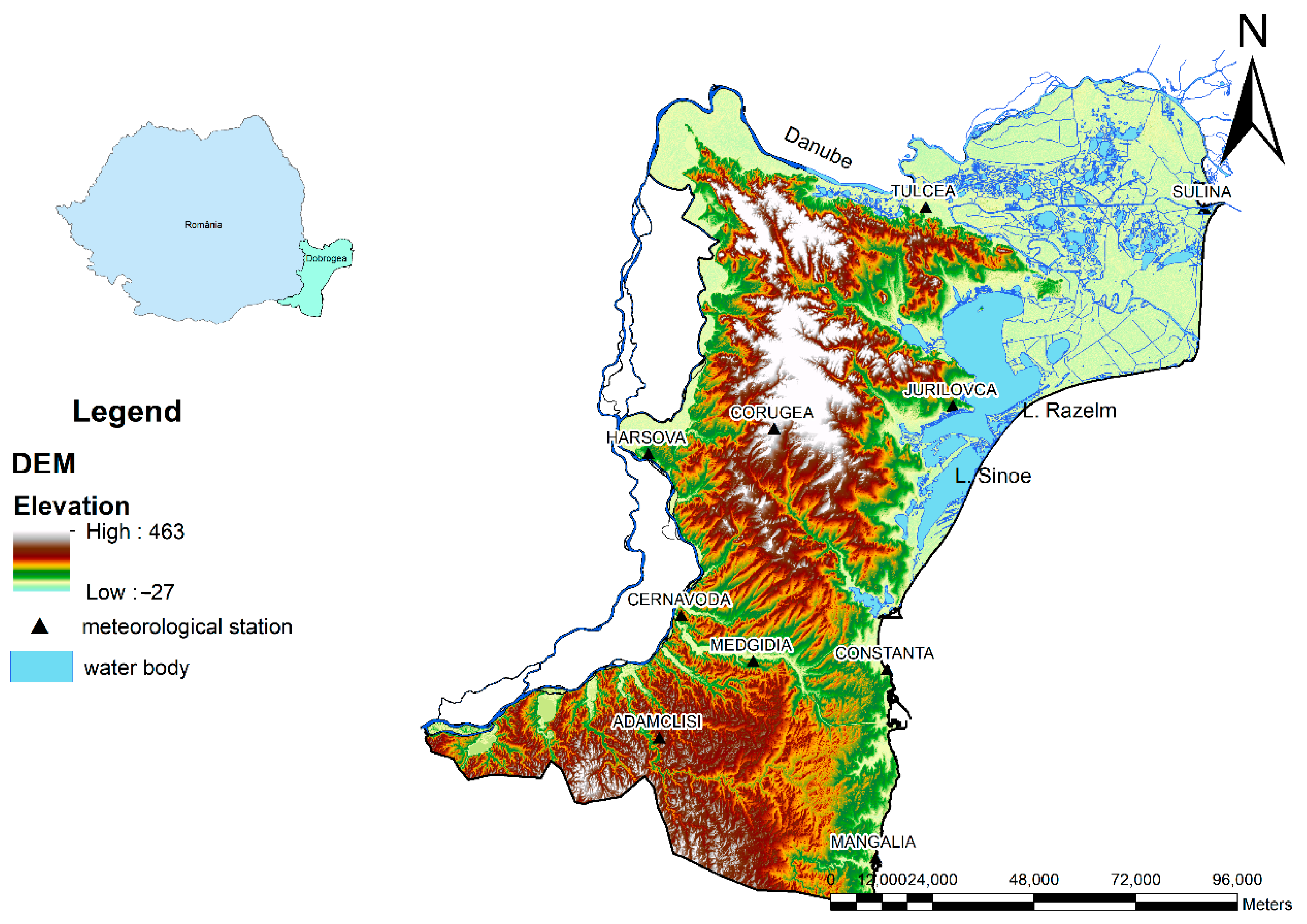
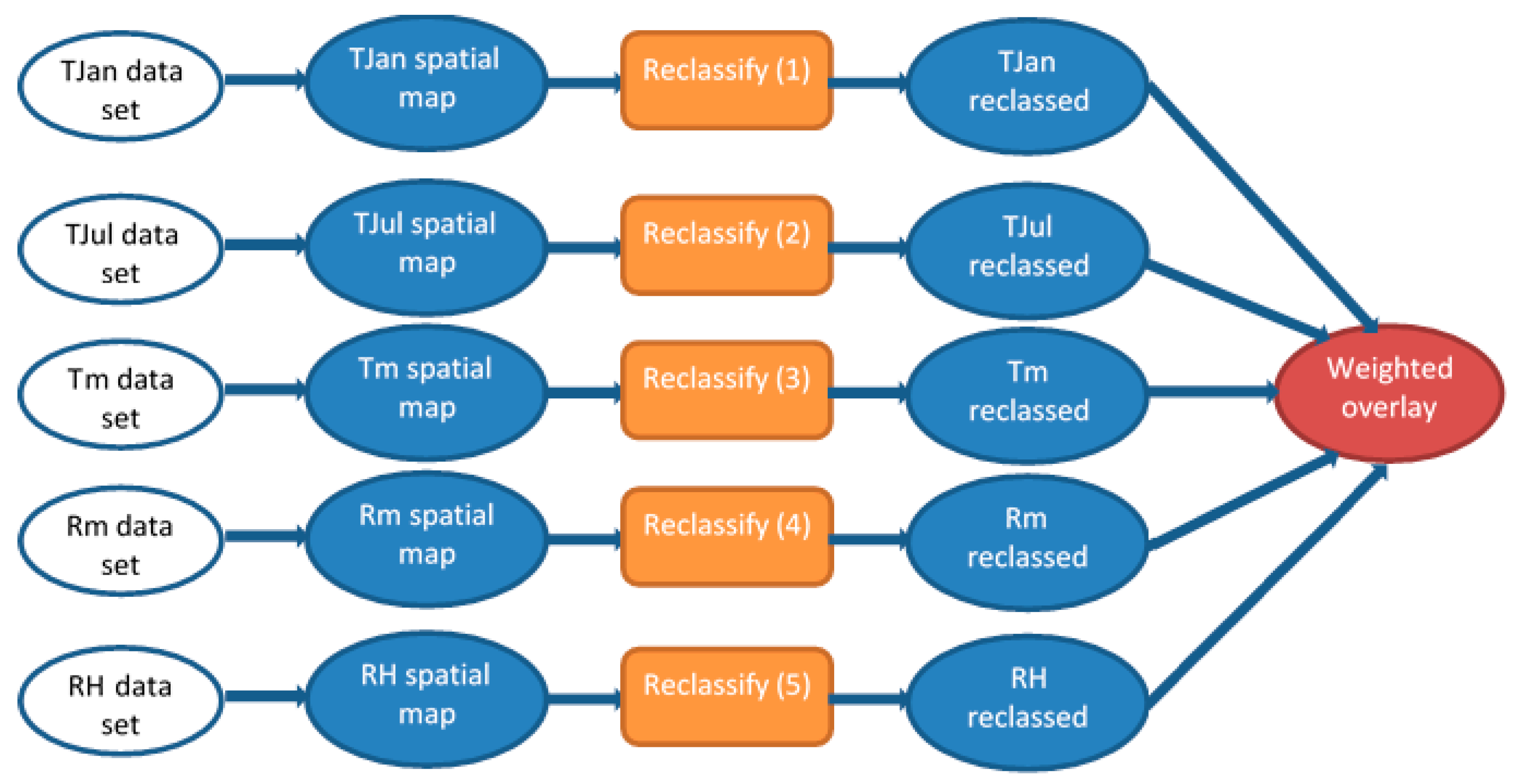
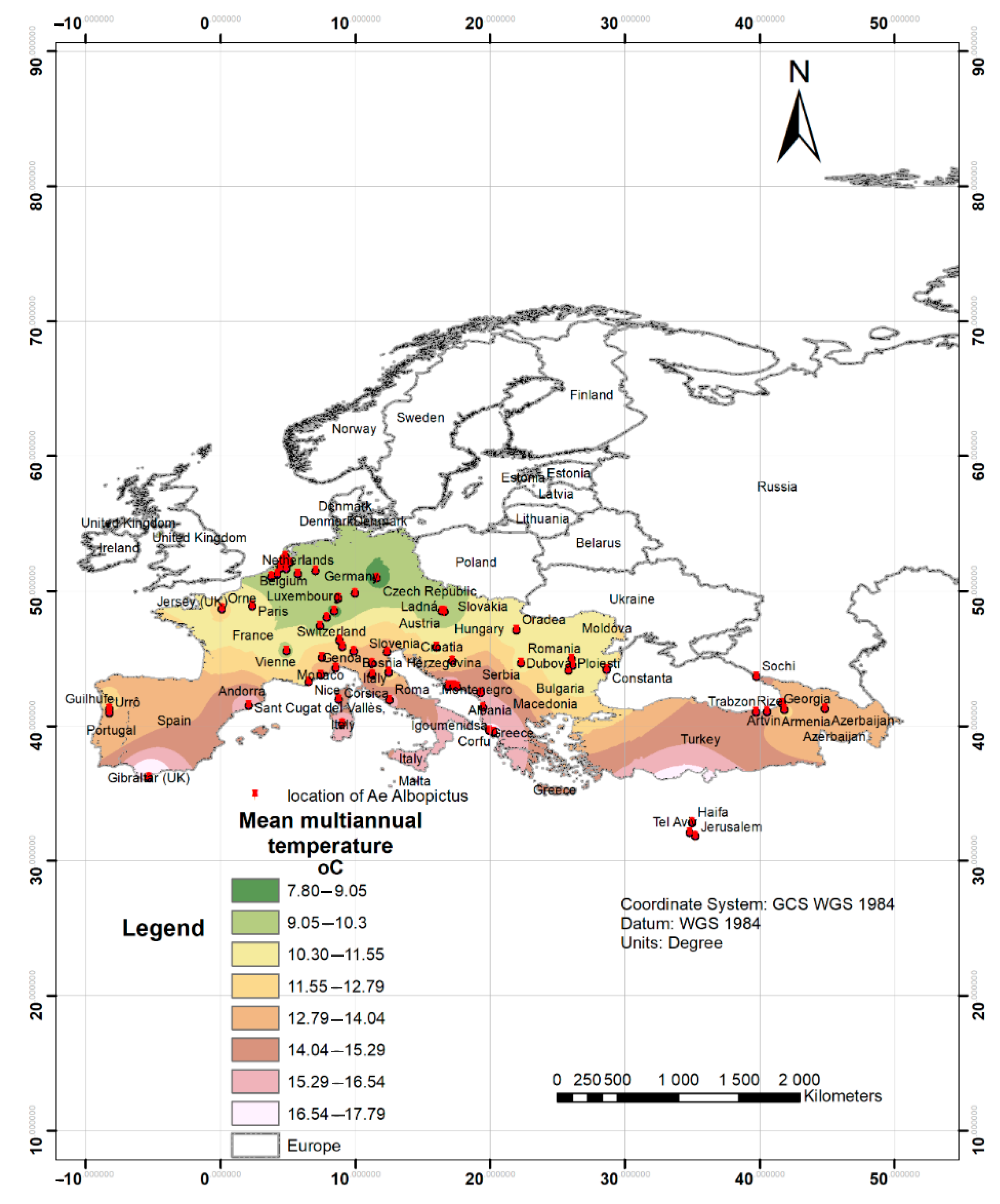
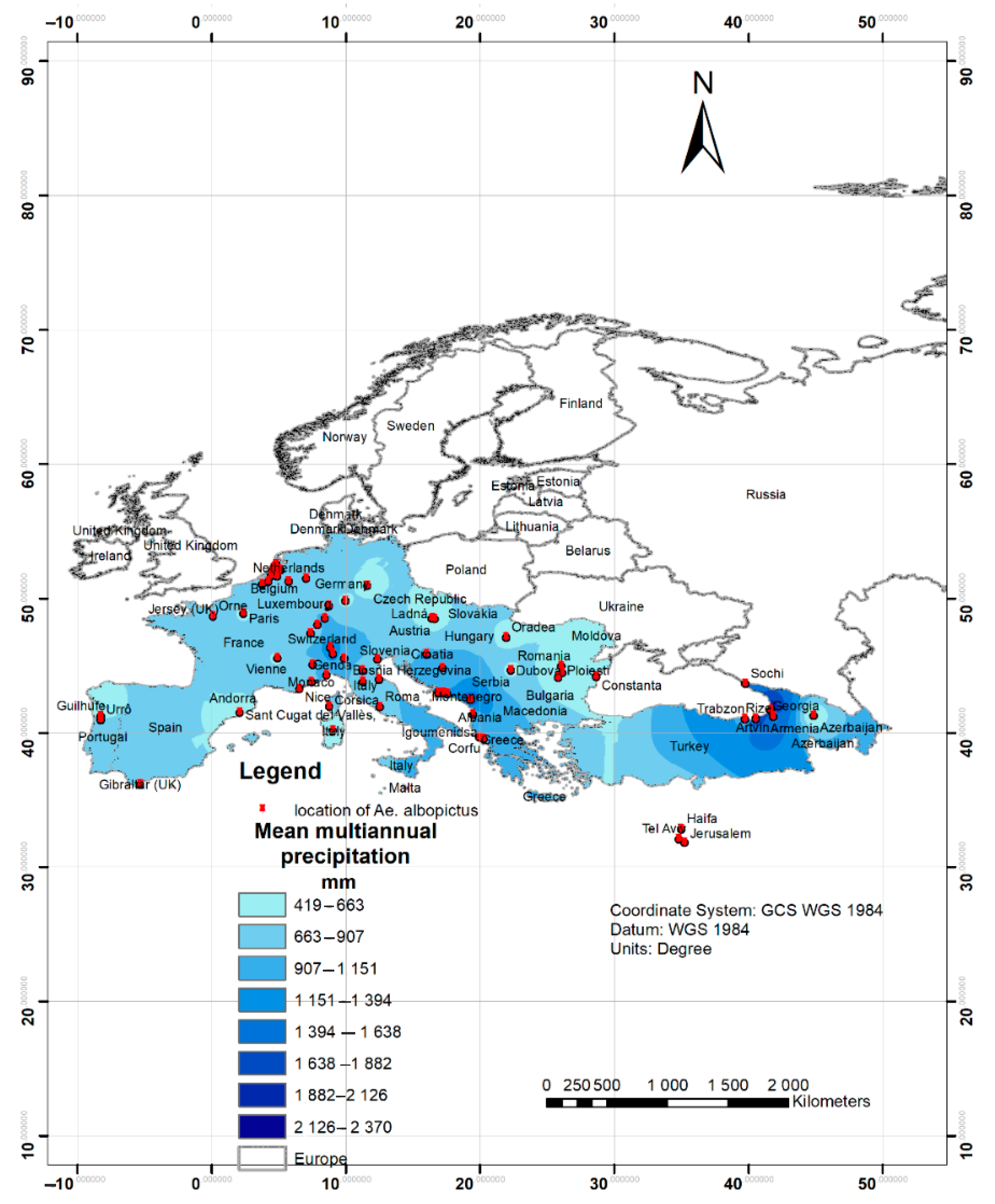

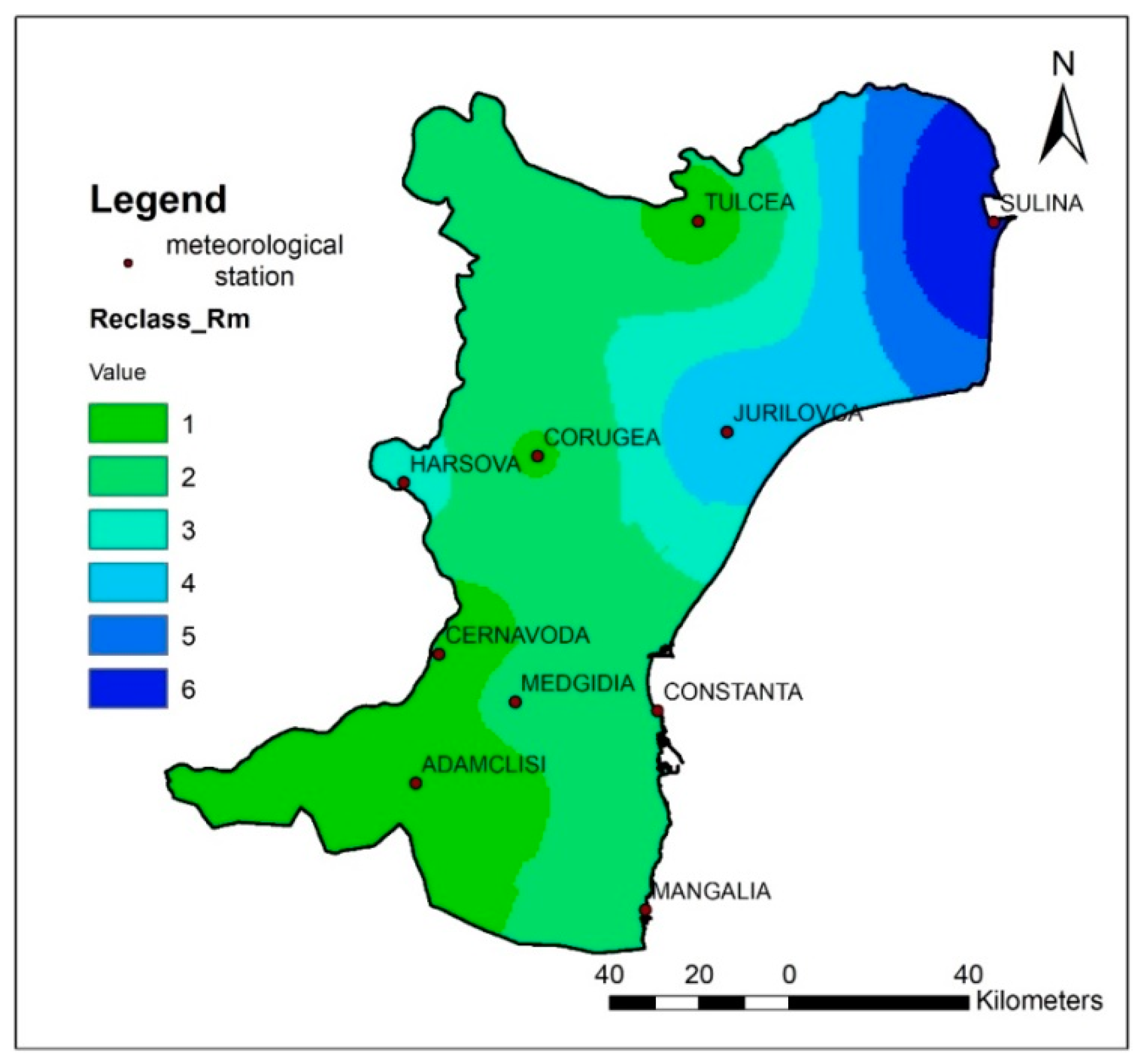
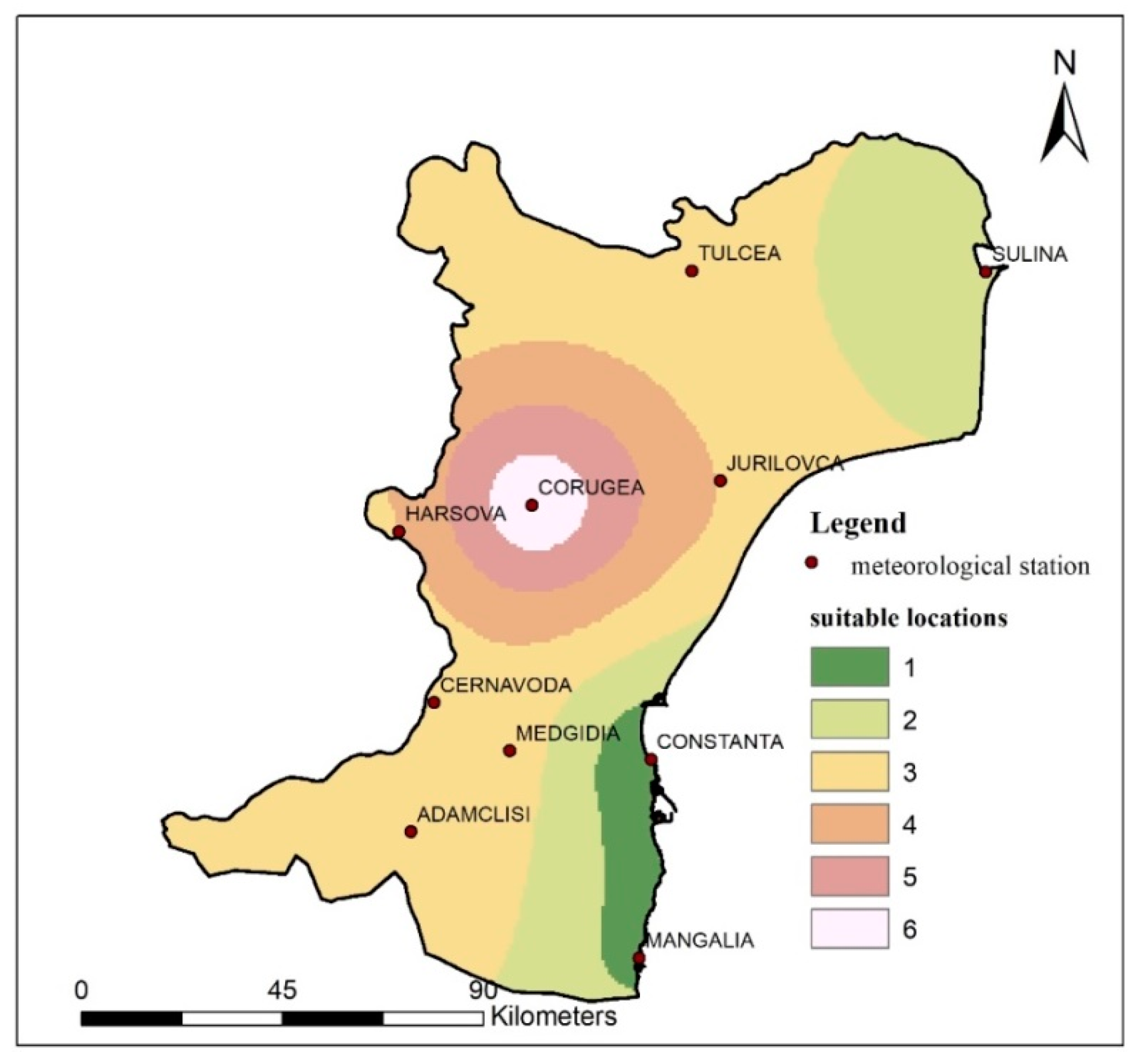
| No. | Location | Latitude, Longitude | MAT (°C) | MAMaxT (°C) | MAMinT (°C) | MAP (mm) | RH (%) |
|---|---|---|---|---|---|---|---|
| 1 | Durrës | 41.3246° N, 19.4565° E | 15.9 | 28.8 | 4.8 | 1064 | 67 |
| 2 | Genoa | 44°24′40″ N 8°55′58″ E | 14.7 | 27.3 | 3.5 | 1086 | 66 |
| 3 | Veneto | 45.4415° N, 12.3153° E | 13.2 | 27.4 | 0.2 | 830 | 76 |
| 4 | Lombardia | 45.4791° N, 9.8452° E | 13.1 | 29.3 | −0.8 | 1013 | 75 |
| 5 | Emilia-Romagna | 44.5968° N, 11.2186° E | 14 | 30.3 | −0.6 | 774 | 70 |
| 6 | Toscana | 43.7711° N, 11.2486° E | 14.5 | 30.9 | 1.9 | 864 | 70 |
| 7 | Piemonte | 45.0522° N, 7.5154° E | 12.6 | 29.3 | −1.7 | 846 | 75 |
| 8 | Sardegna | 40.1209° N, 9.0129° E | 16.2 | 29.2 | 6.1 | 419 | 73 |
| 9 | Roma | 41.9028° N, 12.4964° E | 15.7 | 30.6 | 3.8 | 798 | 75 |
| 10 | Nice | 43.2154 N, 6. 5059 E | 10.4 | 23.3 | 0.3 | 721 | 76 |
| 11 | Corsica | 41.9192° N, 8.7386° E | 15.2 | 26.9 | 5.8 | 638 | 79 |
| 12 | Orne | 48.6389° N, 0.0848° E | 11.9 | 27.3 | −0.5 | 781 | 79 |
| 13 | Vienne | 45.5256° N, 4.8743° E | 9.9 | 26.1 | −3.7 | 623 | 76 |
| 14 | Paris | 48.8566° N, 2.3522° E | 11.3 | 24.8 | 0.7 | 637 | 78 |
| 15 | Vrasene | 51.2194° N, 4.1945° E | 10.2 | 21.9 | 0.1 | 770 | 83 |
| 16 | Oost-Vlaanderen | 51.0362° N, 3.7373° E | 10.2 | 21.5 | 0.4 | 754 | |
| 17 | Podgorica | 42.4304° N, 19.2594° E | 15.4 | 32.6 | 1.5 | 1631 | 64 |
| 18 | Ticino | 46.3317° N, 8.8005° E | 11.4 | 25.4 | −0.6 | 1364 | 67 |
| 19 | Chiasso | 45.8367° N, 9.0246° E | 11.9 | 26.8 | −1.1 | 1267 | 67 |
| 20 | Sant Cugat del Vallès | 41°28′ N, 2°4′ E | 16.1 | 27.9 | 6.0 | 596 | 72 |
| 21 | Zagreb | 45.8150° N, 15.9819° E | 11 | 27.3 | −3.2 | 930 | 75 |
| 22 | Podobuče | 42.9471° N, 17.2865° E | 16.3 | 30.5 | 4.9 | 1073 | |
| 23 | Orebić | 42.9758° N, 17.1779° E | 16 | 30.1 | 4.7 | 1035 | |
| 24 | Korčula | 42.9297° N, 16.8886° E | 16.3 | 30.3 | 5.1 | 1004 | |
| 25 | Pelješac | 42.8653° N, 17.5505° E | 14.2 | 27.9 | 2.9 | 1290 | 64 |
| 26 | Corfu | 39.6243° N, 19.9217° E | 16.9 | 31.2 | 5.7 | 1146 | 70 |
| 27 | Igoumenidsa | 39.5061° N, 20.2655° E | 16.7 | 31.9 | 4.7 | 1108 | 70 |
| 28 | Haarlemmermeer | 52.3004° N, 4.6744° E | 9.2 | 20.6 | −0.1 | 805 | 84 |
| 29 | South-Holland | 52.0208° N, 4.4938° E | 9.6 | 20.9 | 0.1 | 682 | |
| 30 | Noord-Holland | 52.5206° N, 4.7885° E | 9.2 | 20.6 | −0.1 | 805 | 84 |
| 31 | Utrecht | 52.0907° N, 5.1214° E | 9.3 | 21.3 | −0.5 | 804 | 82 |
| 32 | Heijningen | 51.6559° N, 4.4125° E | 9.8 | 21.3 | 0.1 | 776 | 81 |
| 33 | Oosterhout | 51.6410° N, 4.8617° E | 9.6 | 21.5 | −0.2 | 791 | 81 |
| 34 | Montfoort | 52.0362° N, 4.9519° E | 9.4 | 21.3 | −0.3 | 802 | 82 |
| 35 | Weert | 51.2439° N, 5.7142° E | 9.7 | 21.9 | −0.4 | 775 | 82 |
| 36 | Banja Luka | 44.7722° N, 17.1910° E | 11 | 27.9 | −3.2 | 996 | 75 |
| 37 | Lanžhot | 48.7244° N, 16.9670° E | 9.5 | 25.6 | −4.5 | 620 | 75 |
| 38 | Ladná | 48.8054° N, 16.8723°E | 9.5 | 25.5 | −4.4 | 591 | 75 |
| 39 | Mikulov | 48.8053° N, 16.6377° E | 9.2 | 25.2 | −4.6 | 586 | 75 |
| 40 | Baden-Württemberg | 47.9958° N, 7.8522° E | 9.3 | 23.4 | −2.7 | 674 | 77 |
| 41 | Monaco | 43.7384° N, 7.4246° E | 14.8 | 26.6 | 4.4 | 811 | 76 |
| 42 | San Marino | 43.9424° N, 12.4578° E | 11.8 | 26 | 0.1 | 805 | 78 |
| 43 | Bucuresti | 44.4268° N, 26.1025° E | 10.8 | 28.6 | −5.5 | 598 | 70 |
| 44 | Sochi | 43.6028° N, 39.7342° E | 14.5 | 27.1 | 3.2 | 1514 | 75 |
| 45 | Wurzburg | 49° 47′ 0″ N, 9° 56′ 0″ E | 9.5 | 24.2 | −2.6 | 603 | 77 |
| 46 | Freudenstadt | 48°27′48″ N, 8°24′40″ E | 7.8 | 22 | −4.4 | 1024 | 77 |
| 47 | Essen | 51°27′ 3″ N, 7°0′47″ E | 9.9 | 22.7 | −0.6 | 843 | 78 |
| 48 | Jena-Lobeda | 50°55′38″ N, 11°35′10″ E | 8.6 | 22.8 | −2.5 | 565 | 78 |
| 49 | Heidelberg-West | 49°25′0″ N, 8°43′0″ E | 10.2 | 24.6 | −1.7 | 666 | 77 |
| 50 | Freiburg-East | 47°59′0″ N, 7°51′0″ E | 10.4 | 25 | −1.1 | 887 | 77 |
| 51 | Penafiel | 41°12′0″ N, 8°17′0″ W | 12.1 | 28.5 | −0.1 | 434 | 77 |
| 52 | Guilhufe | 41°12′14″ N, 8°16′38″ W | 12.1 | 28.5 | −0.1 | 434 | 77 |
| 53 | Urrô | 40°55′34″ N, 8°17′35″ W | 14.5 | 26.4 | 4.5 | 1162 | 77 |
| 54 | Gibraltar | 36°8′0″ N, 5°21′0″ W | 17.8 | 28.3 | 9 | 729 | 72 |
| 55 | Batumi | 41°38′45″ N, 41°38′30″ E | 14.2 | 26.2 | 2.8 | 2393 | 74.5 |
| 56 | Bagratashen | 41°14′45″ N, 44°49′16″ E | 13.3 | 31.4 | −3.1 | 444 | 64 |
| 57 | Tel Aviv | 32°4′0″ N, 34°47′0″ E | 20.2 | 32 | 8.7 | 562 | 71 |
| 58 | Jerusalem | 31°47′0″ N, 35°13′0″ E | 17.2 | 30.5 | 4.9 | 474 | 53 |
| 59 | Haifa | 32°49′0″ N, 34°59′0″ E | 21 | 32.2 | 9.3 | 525 | 63 |
| 60 | Artvin | 41°11′0″ N, 41°49′5″ E | 11.8 | 25.7 | −1.8 | 1168 | |
| 61 | Rize | 41°1′29″ N, 40°31′20″ E | 14.3 | 25.7 | 3.4 | 1860 | |
| 62 | Trabzon | 41°0′ 8″ N, 39°43′21″ E | 14.4 | 25.7 | 3.9 | 891 | 72 |
| 63 | Oradea | 47°4′20″ N, 21°55′16″ E | 10.6 | 27.4 | −4.9 | 600 | 77 |
| 64 | Ploiesti | 44°56′0″ N, 26°2′0″ E | 10.3 | 27.6 | −6.2 | 588 | 77 |
| 65 | Dubova | 44°37′0″ N, 22°16′0″ E | 11.1 | 27.9 | −3.3 | 619 | 75 |
| 66 | Constanta | 44°10′0″ N, 28°38′0″ E | 11.6 | 25.8 | −2.3 | 423 | 81 |
| 67 | Petru Rares | 44°05′50″ N, 25°47′29″ E | 10.9 | 28.6 | −5.3 | 595 | 77 |
| Average | 12.56 | 26.59 | 0.58 | 850.5 | 74.81 | ||
| Max | 21 | 32.6 | 9.3 | 2393 | 84 | ||
| Min | 7.8 | 20.6 | −6.2 | 419 | 53 |
| Phase | Temperature (°C) (4) | Total Rainfall (2) (mm) | Day Length (3) (h) | |||
|---|---|---|---|---|---|---|
| No | Min | Optimal | No | |||
| Eggs hatching | <10 | 10–11 | 20–25 | >25 | >500 | 11–11.5 |
| Larval development | <5–10 | 25–30 | >40 | 13–14 | ||
| Eggs survival (1) | (−2)–0 | |||||
| Adults survival | 25 | >35 | 9 | |||
| Reproduction | 25–30 | >35 | ||||
| P(10 < T-Mean Annual < 25) | P(20 < T-Mean July < 25) | |
|---|---|---|
| Adamclisi | 0.97633 | 0.979 |
| Cernavoda | 0.98311 | 0.4053 |
| Constanta | 0.992 | 0.8268 |
| Corugea | 0.8714 | 0.8361 |
| Harsova | 0.9892 | 0.9781 |
| Jurilovca | 0.9176 | 0.8855 |
| Mangalia | 0.9934 | 1 |
| Medgidia | 0.9668 | 0.9908 |
| Sulina | 0.995 | 0.8551 |
| Tulcea | 0.9829 | 0.8435 |
| No. | Criteria | Range | Score | Weight |
|---|---|---|---|---|
| 1 | tm (°C) | 10.5 to 10.8 | 6 | 20% |
| 10.8 to 11.1 | 5 | |||
| 11.1 to 11.4 | 4 | |||
| 11.4 to 11.7 | 3 | |||
| 11.7 to 12.0 | 2 | |||
| 12.0 to 2.3 | 1 | |||
| 2 | TJan (°C) | −4.1 to −3.6 | 6 | 20% |
| −3.6 to −3.1 | 5 | |||
| −3.1 to −2.5 | 4 | |||
| −2.5 to 2.0 | 3 | |||
| −2.0 to −1.5 | 2 | |||
| −1.5 to −1.0 | 1 | |||
| 3 | TJul (°C) | 26.6 to 27.2 | 1 | 20% |
| 27.2 to 27.8 | 2 | |||
| 27.8 to 28.4 | 3 | |||
| 28.4 to 29.0 | 4 | |||
| 29.0 to 29.6 | 5 | |||
| 29.6 to 30.2 | 6 | |||
| 4 | Rm (mm) | 519 to 568 | 1 | 20% |
| 478 to 519 | 2 | |||
| 427 to 478 | 3 | |||
| 361 to 427 | 4 | |||
| 283 to 361 | 5 | |||
| 205 to 283 | 6 | |||
| 5 | RH (%) | 72.7 to 74.6 | 6 | 20% |
| 74.6 to 76.5 | 5 | |||
| 76.5 to 78.4 | 4 | |||
| 78.4 to 80.4 | 3 | |||
| 80.4 to 82.3 | 2 | |||
| 82.3 to 84.2 | 1 |
Publisher’s Note: MDPI stays neutral with regard to jurisdictional claims in published maps and institutional affiliations. |
© 2021 by the authors. Licensee MDPI, Basel, Switzerland. This article is an open access article distributed under the terms and conditions of the Creative Commons Attribution (CC BY) license (http://creativecommons.org/licenses/by/4.0/).
Share and Cite
Maftei, C.; Bărbulescu, A.; Rugina, S.; Nastac, C.D.; Dumitru, I.M. Analysis of the Arbovirosis Potential Occurrence in Dobrogea, Romania. Water 2021, 13, 374. https://doi.org/10.3390/w13030374
Maftei C, Bărbulescu A, Rugina S, Nastac CD, Dumitru IM. Analysis of the Arbovirosis Potential Occurrence in Dobrogea, Romania. Water. 2021; 13(3):374. https://doi.org/10.3390/w13030374
Chicago/Turabian StyleMaftei, Carmen, Alina Bărbulescu, Sorin Rugina, Cristian Dorin Nastac, and Irina Magdalena Dumitru. 2021. "Analysis of the Arbovirosis Potential Occurrence in Dobrogea, Romania" Water 13, no. 3: 374. https://doi.org/10.3390/w13030374






